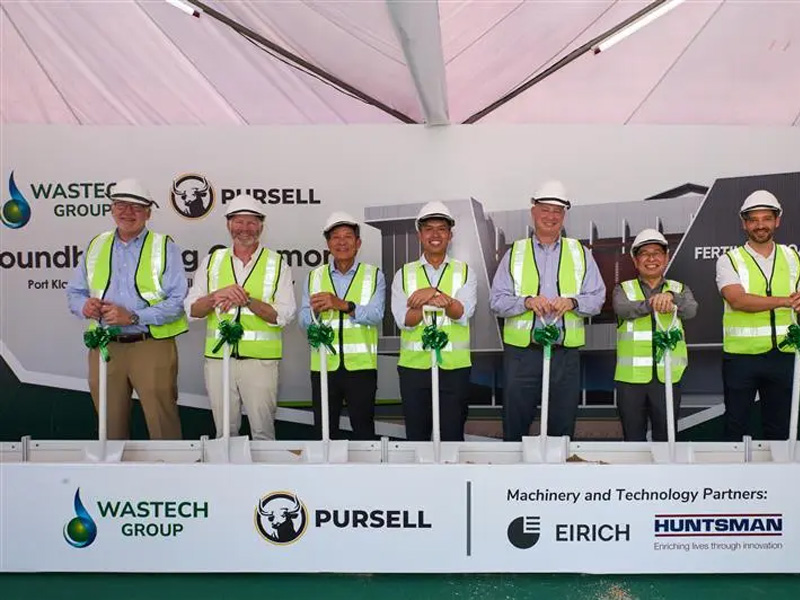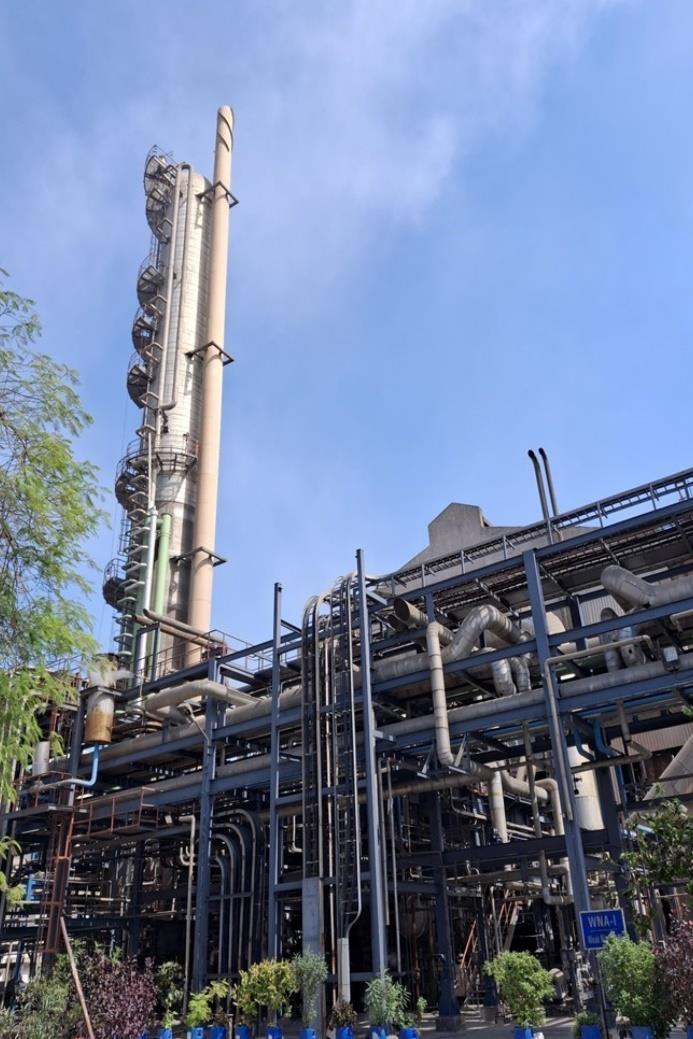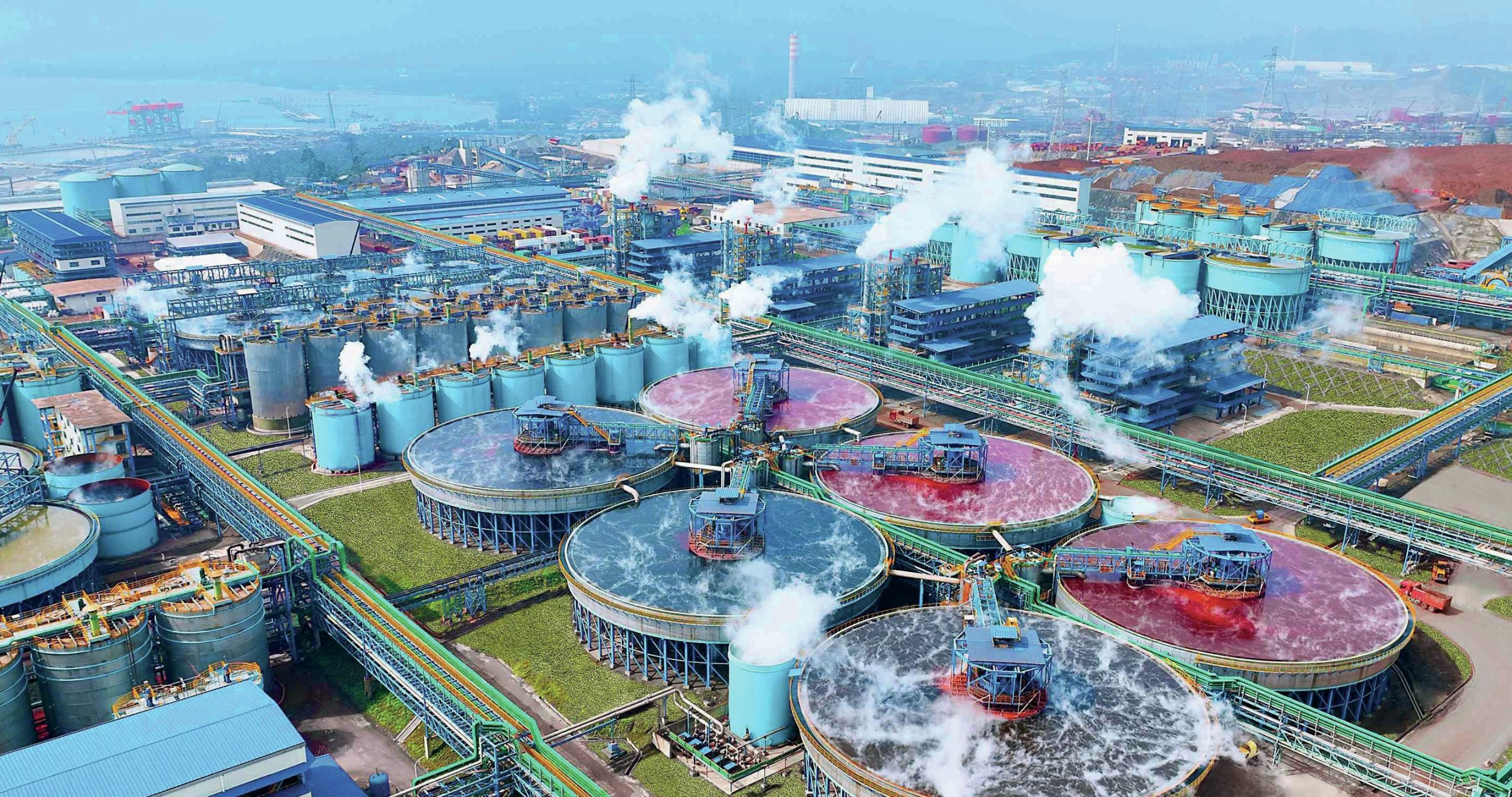Nitrogen+Syngas 388 Mar-Apr 2024
31 March 2024
Syngas News Roundup
Syngas News
NORWAY
NextChem to supply technology for biofuels plant
NextChem Tech, has signed a contract with Paul Wurth SA, a subsidiary of SMS group, and Norsk e-Fuel AS for a licensing and engineering design package relating to its NX CPO (catalytic partial oxidation) technology, which will be used in an industrial scale plant producing sustainable aviation fuel (SAF) from green hydrogen and biogenic CO2 in Mosjøen, Norway. NextChem’s NX CPO technology produces synthesis gas via a very fast controlled partial oxidation reaction. When applied to synthetic fuel production, it can improve carbon efficiency recovery yield. The first plant developed by Norsk e-Fuel will have a production capacity of 40,000 t/a of green fuel and will enter operation after 2026. Based on the initial design, two additional facilities with a capacity of around 80 000 t/a each are planned to be built by 2030. The fuels will current aviation emissions.
Karl Hauptmeier, CEO Norsk e-Fuel said: “Our collaboration with NextChem Tech is another step towards improving carbon efficiency of our production processes while simultaneously reducing costs.”
NX CPO technology converts hydrocarbon or biologically based feedstocks via a controlled partial oxidation in presence of a catalyst that facilitates the conversion into syngas through an entirely heterogeneous very fast reaction.
Eidesvik Offshore launches methanol-powered vessel
Norwegian shipowner Eidesvik Offshore is joining forces with Agalas to build a state-of-the-art construction support vessel (CSV) to perform subsea and offshore wind operations, equipped with methanol engines and a battery hybrid system. The vessel will be owned by Eidsvik Agalas AS, a joint venture company with Eidesvik retaining a majority stake of 50.1%. The remaining shares will be owned by Northern Norway shipowners Agalas. Eidesvik Agalas AS has been granted options for 4 additional vessels.
Eidesvik has a history of innovation, being a first mover in the adoption of LNG and battery technology for offshore vessels, and now will introduce what it says is the world’s most eco-friendly vessel within its operating segments. Using a battery hybrid system alongside dual fuel engines capable of operating on either methanol or marine gasoil (MGO) is a significant leap forward in environmental sustainability for the industry. The ship will be built at the Sefine Shipyard in Turkey, with delivery in early 2026. It will be equipped to perform inspection, maintenance and repair work, and upon delivery will enter into a 3 to 5-year time charter with Reach Subsea. Full management of the vessel, including crewing, will be provided by Eidesvik.
“This new asset aligns perfectly with our strategy, which is founded on sustainable shipping solutions and long-term partnerships with our clients. The versatile vessel is designed to meet the demands of both the oil & gas sector and the offshore wind industry. This flexibility increases our capabilities and competitiveness in the future energy mix”, said CEO and president of Eidesvik Offshore, Gitte Gard Talmo.
CHINA
Collaboration on sustainable energy solutions
BASF process catalysts has announced a new collaboration with Envision Energy, a leading green technology provider, to further develop the conversion of green hydrogen and CO2 into green methanol through novel process design. The two companies aim to optimise the process of producing green methanol from green hydrogen and CO2 , paving the way for a more sustainable energy landscape. This collaboration will see BASF provide its SYNSPIRETM catalyst technology, which Envision Energy will integrate with its innovative energy management system. The two organisations plan to demonstrate the viability of the advanced process design next year, at Envision Energy’s Chifeng site in Inner Mongolia, China.
BASF says that the new catalyst it has developed represents a “significant breakthrough” in enabling efficient conversion of green hydrogen and CO2 into methanol. Methanol offers immense potential to replace fossil fuels and derivatives gasoline by providing an alternative source of energy for road, shipping and air transport, as well as other industries without a change in infrastructure, and which be stored at room temperature and ambient pressure.
Envision Energy will design a process package that maximises the efficiency of the catalyst technology while fully enabling the dynamic conversion of green hydrogen and CO2 into methanol, using the onstream time of wind power. Envision Energy will leverage its AIoT (Artificial Intelligence of Things) platforms to optimise the novel, dynamic mode of chemical plant operation.
Detlef Ruff, Senior Vice President, process catalysts at BASF, said: “BASF process catalysts looks forward to working with Envision Energy in our shared mission to drive sustainable energy solutions. By combining our innovative catalyst technology with Envision Energy’s deep expertise, we are confident we can unlock the full potential of green hydrogen and CO2 conversion to e-methanol.”
ITALY
Contract awarded for hydrogen plant
KT – Kinetics Technology has been awarded an engineering, procurement and construction contract by Eni to build a hydrogen plant at Eni’s Livorno refinery. The value of the contract is €123 million, and the project is scheduled for completion in 2026. It will process natural gas and biogenic feedstocks to create hydrogen for the production of biofuels for mobility at the Livorno site, processing various biogenic feedstocks, mainly waste such as cooking oils and animal fats, and residues from the agribusiness industry. In addition, the plant is designed so that a residual CO2 capture unit can be implemented at a later stage.
The construction of the new unit is part of Eni’s project to convert its Livorno plant into a biorefinery.
Alessandro Bernini, CEO of KT’s parent company Maire, commented, “We are proud of this important achievement with Eni.”
New model for carbon neutral chemistry
NextChem Tech has launched a new computer model for its “e-factory for carbon-neutral chemistry”. This model has been developed via a cooperation agreement with newcleo to produce, on an exclusive basis, a conceptual study for carbon-neutral hydrogen production using nuclear technology.
Sister company Tecnimont (through its Integrated E&C Solutions business unit) will provide high-level consultancy services for newcleo’s plan for the implementation of an innovative power plant based on newcleo’s LFR-AS-200 technology, a small modular lead-cooled fast reactor fuelled with MOX fuel thanks to Tecnimont’s modularisation approach to optimise construction and planning methodology, reducing time and costs. This enables the production of electrolytic hydrogen and sustainable chemicals, in line with the recent European Union’s decision to include innovative Gen-IV nuclear technology like the newcleo one within the EU taxonomy of environmentally sustainable economic activities.
SOUTH KOREA
Ammonia cracking plant for Approtium
Topsoe has signed an engineering agreement with Approtium to convert low-carbon ammonia into hydrogen using its H2RE-TAKE™ technology. Approtium plans to build an ammonia cracking plant to produce 75,000 t/a of low-carbon hydrogen. The plant will be built in Ulsan, South Korea, and production is expected to start in 2027. It will support South Korea’s growing need for co-firing in the power generation sector. The project is also expected to contribute significantly to South Korea’s target of reducing greenhouse gas emissions with 40% in 2030 (from a 2018 baseline).
Elena Scaltritti, Chief Commercial Officer at Topsoe, said: “We are excited to embark on this project with Approtium, showcasing not only the potential of our innovative technology, but also the strengths of ammonia as a key energy carrier. Greenhouse gas emissions need to be reduced drastically on a global scale and through this project, Topsoe delivers a strong contribution to support South Korea’s decarbonization targets.”
James Kim, CEO of Approtium, said: “Our ultimate goal has been to provide clean hydrogen to clients and contribute to accelerate carbon neutrality in Korea. This collaboration with Topsoe marks a significant milestone in our relentless pursuit of that goal and signifies our commitment to providing value to both our clients and society.”
AUSTRALIA
Green methanol plant for South Australia
Hamburg-based energy company Mabanaft has received a grant approval from Projektträger Jülich in Germany. The funding marks a crucial milestone for the potential construction of a new green methanol plant in Port Augusta, South Australia. Together with Australian renewable energy company Vast, Mabanaft is assessing to build a demonstration plant with a capacity of around 7,500 t/a of green methanol. Project developer Vast specialises in concentrated solar thermal power (CSP) energy systems, and Mabanaft intends to build a solar methanol plant using a 10 MW electrolyser. The planned demonstration plant could be operational in the beginning of 2027, and would then provide customers with green methanol based on renewable energy. In the future, and after evaluation of effectiveness, other project sites in or near Europe could be added.






